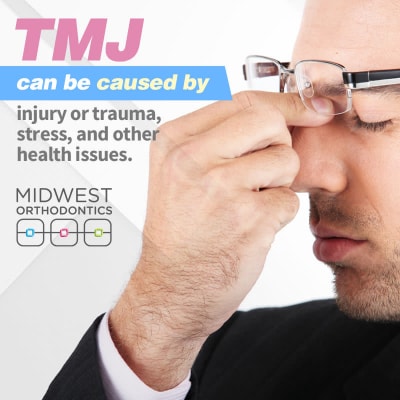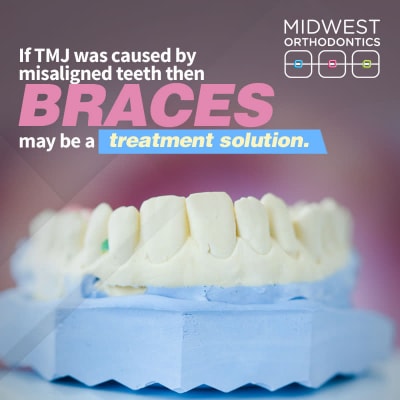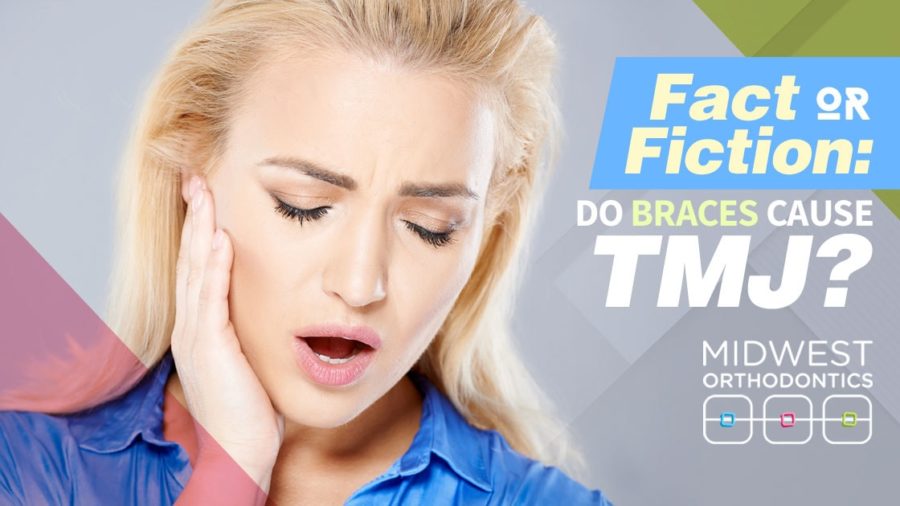This is a question we hear a lot in our office, and we wanted to take this opportunity to separate fact from fiction. Do braces cause TMJ?
The short answer is that braces do not directly cause TMJ. However, the relationship between the two is not completely cut and dry, and it is possible that they can overlap. Whether you have braces or not, here’s what you need to know about their relationship to TMJ.
What is TMJ?

Temporomandibular joint disorder, more commonly known as TMJ, causes chronic pain and dysfunction in the jaw joints and muscles that control jaw movement. It can be caused by injury, trauma, stress, and other health issues.
The jaw plays an essential role in eating, talking, smiling, and many other essential functions. Any or all of these can be impacted by TMJ. Pain is not necessarily confined to the jaw either; it can extend to the ears or the rest of your face, which sometimes makes it difficult to diagnose.
The good news is that most cases of TMJ can go away on their own without medical treatment. Your dentist or doctor may recommend over the counter pain relievers or physical therapy to help relax jaw muscles.
In the case of stress-induced TMJ, counseling may help alleviate the underlying factors that cause you to clench your jaw in the first place.
Braces and TMJ
With all of that in mind, it’s easy to see how braces alone are not enough to cause TMJ. However, people who need braces have teeth alignment issues that can extend to the jaw and cause pain similar to TMJ.
You may also experience jaw pain and tension as braces work to realign teeth. Again, this is not TMJ directly but can feel like it. This applies to all types of braces — even though metal brackets work differently than Invisalign®, the end result is the same for all of them.
Because TMJ does not have a specific treatment, on some level it does not really matter whether braces are the cause of the jaw pain. Over the counter pain relievers or massage techniques can help relax sore muscles no matter how they got that way.

If TMJ is caused by teeth grinding or jaw clenching (a condition known as bruxism), your dentist may recommend that you wear a mouthguard at night to prevent you from doing those things in your sleep. If you already have braces, you will likely need a special mouthguard specifically for people with braces.
These mouthguards are typically a little wider to fit around braces and are a little more expensive than traditional brands you might find in a drugstore. Your orthodontist can recommend specific guards to look for.
Braces may even be used as a treatment for TMJ if it’s caused by misaligned teeth. Even if your teeth look straight, there might be alignment issues that you can’t see but that are placing a strain on your jaw.
When to Seek Help for TMJ
If you wear braces and have jaw pain, it’s worth mentioning to your orthodontist at your next visit. On the flip side, if you have TMJ and suspect that it might be caused by alignment issues in your mouth, then it might be time to see an orthodontist.
Our Chicago Orthodontics teams will work closely with your dentist to ensure that your symptoms are diagnosed and treated properly, regardless of whether you officially have TMJ.
We will thoroughly examine your bite and alignment to make sure that everything is in order.
So, do braces cause TMJ? The bottom line is that even though the relationship between braces and TMJ is complicated, you should not have to suffer from jaw pain no matter what causes it. Contact us today to schedule a free consultation and take the first step toward a pain-free mouth.




Leave a Reply
Your email is safe with us.